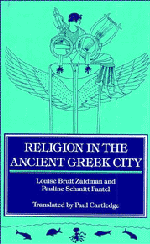Book contents
- Frontmatter
- Contents
- List of illustrations
- Author's preface to the English translation
- Translator's introduction
- List of sources
- PART I Introduction: How should we study Greek civic religion?
- PART II Cult-practices
- PART III Systems for representing the divine
- 12 Myths and mythology
- 13 A polytheistic religion
- 14 Forms of imaginative projection
- PART IV Envoi
- Appendixes
- Bibliography
- Index
13 - A polytheistic religion
Published online by Cambridge University Press: 05 June 2012
- Frontmatter
- Contents
- List of illustrations
- Author's preface to the English translation
- Translator's introduction
- List of sources
- PART I Introduction: How should we study Greek civic religion?
- PART II Cult-practices
- PART III Systems for representing the divine
- 12 Myths and mythology
- 13 A polytheistic religion
- 14 Forms of imaginative projection
- PART IV Envoi
- Appendixes
- Bibliography
- Index
Summary
DIVINE POWERS: GODS, DAIMONES, HEROES
The Classical Greeks did not define themselves as ‘polytheists’. The nearest ancient equivalent to our ‘polytheism’, namely polutheos doxa (literally, ‘belief in many gods’), was coined by Philo of Alexandria, a philosopher of the first century ce whose ancestral religion, Judaism, was monotheistic. But polytheists the Classical Greeks certainly were, since a polytheistic religion is characterized by the plurality of the divine powers that it recognizes and of the cults that it observes; indeed, for the Greeks everything, according to the formula attributed to Thales (sixth century bce), was ‘full of gods’. This diversity of gods, however, was not necessarily incompatible with the idea of a unity of the divine. As the Greeks saw it, the divine simply manifested itself in multiply diverse aspects.
The Greeks worshipped more than one type of divine power, of which there were three principal categories: gods, daimones and heroes. Within each category they distinguished several sub-categories. Each divinity, moreover, might be invoked under titles or epithets that emphasized different aspects of its power; Athene, for example, is known to have been honoured under as many as fifty or so such epithets, including Apatouria, Boulaia, Khalkioikos, Erganē, Parthenos and Polias. Polytheism as a system may thus be thought of as resembling a nest of Russian dolls. We shall now consider each of its aspects in turn.
- Type
- Chapter
- Information
- Religion in the Ancient Greek City , pp. 176 - 214Publisher: Cambridge University PressPrint publication year: 1992



